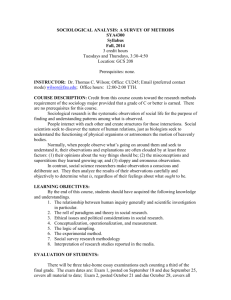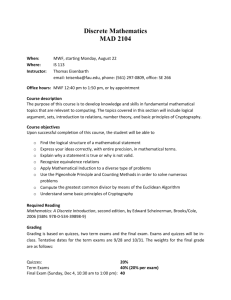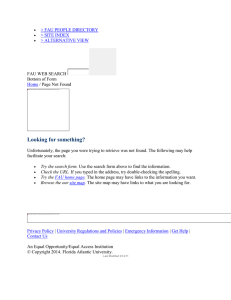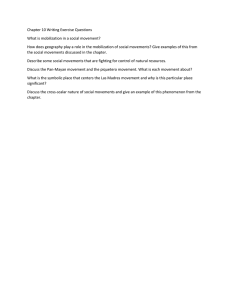Social Movements SYP 4304
advertisement
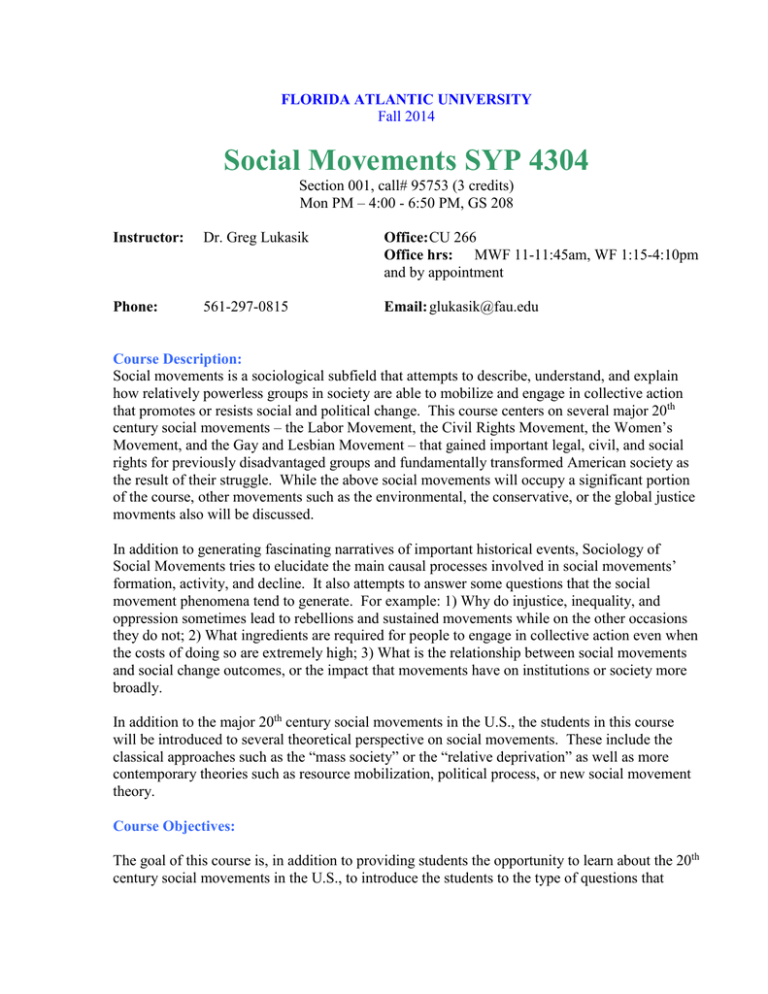
FLORIDA ATLANTIC UNIVERSITY Fall 2014 Social Movements SYP 4304 Section 001, call# 95753 (3 credits) Mon PM – 4:00 - 6:50 PM, GS 208 Instructor: Dr. Greg Lukasik Office: CU 266 Office hrs: MWF 11-11:45am, WF 1:15-4:10pm and by appointment Phone: 561-297-0815 Email: glukasik@fau.edu Course Description: Social movements is a sociological subfield that attempts to describe, understand, and explain how relatively powerless groups in society are able to mobilize and engage in collective action that promotes or resists social and political change. This course centers on several major 20th century social movements – the Labor Movement, the Civil Rights Movement, the Women’s Movement, and the Gay and Lesbian Movement – that gained important legal, civil, and social rights for previously disadvantaged groups and fundamentally transformed American society as the result of their struggle. While the above social movements will occupy a significant portion of the course, other movements such as the environmental, the conservative, or the global justice movments also will be discussed. In addition to generating fascinating narratives of important historical events, Sociology of Social Movements tries to elucidate the main causal processes involved in social movements’ formation, activity, and decline. It also attempts to answer some questions that the social movement phenomena tend to generate. For example: 1) Why do injustice, inequality, and oppression sometimes lead to rebellions and sustained movements while on the other occasions they do not; 2) What ingredients are required for people to engage in collective action even when the costs of doing so are extremely high; 3) What is the relationship between social movements and social change outcomes, or the impact that movements have on institutions or society more broadly. In addition to the major 20th century social movements in the U.S., the students in this course will be introduced to several theoretical perspective on social movements. These include the classical approaches such as the “mass society” or the “relative deprivation” as well as more contemporary theories such as resource mobilization, political process, or new social movement theory. Course Objectives: The goal of this course is, in addition to providing students the opportunity to learn about the 20th century social movements in the U.S., to introduce the students to the type of questions that sociologists ask in the study of social movements and the types of theoretical tools used in answering these questions. I hope this course will facilitate students’ understanding of social movements as the major force behind changes in society and gives students the critical and methodological skills to evaluate and explain social movement phenomena as they occur in the contemporary world. Course Procedures: While lectures will be the main component of the course, I hope that students’ participation will enhance the active learning process and make the course more interactive and less formal. In addition to lectures and class discussions, I intend to use videos, overheads, and possibly other sources to enhance the overall student experience in the classroom and contribute to better understanding of the material. Sometimes my lectures will cover material not discussed in the textbook or other assigned readings, but you are still responsible for this material. I expect everyone to attend class having read the assignment indicated on the syllabus. I intend to make students’ discussion of the assigned readings an integral element of each class. In addition, students will be required to work in groups to complete in-class exercises that are designed to enhance students’ comprehension, analytical, and communication skills (see Course Requirement section for more details). In this course I will be posting PowerPoint presentations, lecture outlines, assignments, exam study guides, and announcements onto Blackboard. You may access these sources by going to http://blackboard.fau.edu Required Texts: Staggenborg, Suzanne. 2011. Social Movements. New York and Oxford: Oxford University Press Additional Readings will be posted in Blackboard These book is available at the FAU Bookstore as well as at Booksmart. If you wish you may purchase these books from other retailers, including online retailers. Please come to class having read the textbook chapter and/or other reading assigned for that day. You will notice that each textbook chapter concludes with a short list of review questions. You may be required to answer these questions for class assignments, Q papers (see below), and you may find that these questions help prepare you for the exams. Course Requirements: 1) Exams. There will be two exams; each worth 25 percent of your final grade. All exams are based on material discussed in class, as well as the videos and the readings. The exams are a mix of multiple choice and short answer questions. The final exam is not cumulative. 2) Research Proposal worth 5 percent of your grade. More details will be given in class. 3) Research Paper worth 20 percent of your grade will test your ability to utilize the conceptual knowledge as well as some of the methodological tools gained from this course in the study of a social movement of your choice. You will be asked to do internet research to find information about a movement and/or social movement organization that is active now to describe its ideology and goals, strategies and tactics, participant base, and analyze its emergence and activity using one (or a combination of two) of the theoretical perspectives on social movements discussed in class. I will give you more detailed guidelines in class. 4) Class attendance is worth 10 percent of your grade. I will take attendance throughout the semester. If you miss a class, it is your responsibility to get the notes from a student in the class; I will not hand out my own lecture notes. Your attendance grade will come from you attending regularly. Please see http://www.fau.edu/provost/files/religious2011.pdf and http://www.fau.edu/provost/files/studentabsences.pdf for a description of what constitutes an excused absence, for which you are not penalized. You are allowed one unexcused absence with no grade penalty. For each additional unexcused absence, your attendance grade will drop one percentage point of your final grade. 5) Five Q Papers will account for 10 percent of your final grade. These short, one page (single space) papers try to critically assess the main arguments posed by the assigned readings and videos watched in class. I will provide specific questions for you to answer in your q papers. In addition, for each q paper you will be asked to provide a single question of your own to be discussed in class. You must bring a copy of your Q Paper to class and turn it in at the beginning of class on the day it is due. In addition, you will be asked to submit a copy of your Q paper electronically via the Assignments link in blackboard on or before the due date. The Q Papers will help you prepare for the exams and your research paper. No Q Papers will be accepted after the due date! 6) Five short, in-class exercises will count for 5 percent of your grade. Every now and then, you will be working in small groups to complete a short class exercise. These exercises will be based on the reading material and/or lectures and videos. Students who miss an in-class exercise due to a valid reason will be allowed to meet with me/TA to discuss an alternative assignment. These alternative assignments will be given only to students with proper documentation. Missed Exams If you know you must miss a test, you may take the exam at a pre-arranged time. Any student who is absent from exam will receive a zero grade. Make-up exams are only given for valid reasons (verifiable proof required). Lack of readiness and heavy traffic are two of many unacceptable circumstances. Make-up exams must be taken within one week after the scheduled exam date. Grading: I will NOT offer extra credit work. I calculate course grades on a 100-point scale. These grades translate to the following letter scale: 93% - 100% = A 90 – 92 = A87 – 89 = B+ 83 – 86 =B 80 – 82 = B- 77 – 79 = C+ 73 – 76 = C 70 – 72 = C67 – 69 = D+ 63 – 66 = D 60 – 62 = DBelow 60% = F Change of Grade Please note that after the semester is over, a grade change will be performed only under extraordinary circumstances (clerical error, documentation of hospitalization during the final exam, etc.). So please be sure to discuss with me any issues relevant to your course grade, such as absences, before the end of the semester. Thank you for your cooperation in this matter. Office Hours and Assistance: I encourage you to come to my office hours to discuss any problems, questions, or suggestions related to the class or to your performance. If you cannot make my office hours, please let me know and we can make an appointment to talk. We will also have a TA for our course, and her/his information (including office hours, location, email, phone number) will be posted in blackboard in ANNOUNCEMENTS. If you need to email me or our TA, in your email you must make sure you include your name, the name of the class, and the class time in order to receive a response. I will generally respond to emails within 48 hours during the week. Email responses will generally take longer during the weekends. Students with Disabilities In compliance with the Americans with Disabilities Act (ADA), students who require special accommodations due to a disability to properly execute coursework must register with the Office for Students with Disabilities (OSD) located in Boca Raton - SU 133 (561-297-3880), in Davie - MOD I (954-236-1222), in Jupiter - SR 117 (561-799-8585), or at the Treasure Coast - CO 128 (772-873-3305) and follow all OSD procedures. For further information, go to www.osd.fau.edu. Students who have registered with OSD should present the appropriate paperwork to me during the first week of class. The Center for Teaching and Learning (CTL) The University’s Center for Teaching and Learning (CTL) offers resources that students may find helpful in improving their study skills and facilitating academic success. Their website is http://www.fau.edu/ctl I encourage you to visit this website and to make use of its many valuable resources, including especially “Tips for Success and Academic Resources” http://www.fau.edu/ctl/TipsForSuccessAndAcademicResourcesStudentResources.php Honor Code: I expect all students to complete their work honestly and independently. Harsh penalties are associated with academic dishonesty. Any failure to comply with the honor code may be the basis for a grade of F in the course. For more information see the Code of Academic Integrity in the University Regulations available at http://www.fau.edu/regulations/chapter4/4.001_Code_of_Academic_Integrity.pdf. The FAU Code of Academic Integrity describes the expectations for students’ ethical academic conduct and the procedures for charging a student with a violation of the Code. It also outlines the procedures for students to appeal such charges. Examples of academic dishonesty include, but are not limited to, the following: (A) Cheating i. The unauthorized use of notes, books, electronic devices or other study aids while taking an examination or working on an assignment. ii. Providing unauthorized assistance to or receiving assistance from another student during an examination or while working on an assignment. iii. Having someone take an exam or complete an assignment in one’s place. iv. Securing an exam, receiving an unauthorized copy of an exam or sharing a copy of an exam. (B) Plagiarism i. The presentation of words from any other source or another person as one’s own without proper quotation and citation. ii. Putting someone else’s ideas or facts into your own words (paraphrasing) without proper citation. iii. Turning in someone else’s work as one’s own, including the buying and selling of term papers or assignments. (C) Other Forms of Dishonesty i. Falsifying or inventing information, data or citations. ii. Failing to comply with examination regulations or failing to obey the instructions of an examination proctor. iii. Submitting the same paper or assignment, or part thereof, in more than one class without the written consent of both instructors. iv. Any other form of academic cheating, plagiarism or dishonesty. Syllabus Changes: I reserve the right to make changes in the syllabus as deemed necessary. I will announce these changes during class meetings (and post announcements in blackboard). Course Outline: Week Date 1 8/18 2 8/25 3 4 9/1 9/8 5 9/15 6 9/22 Topic Introduction to the Course Concepts and Definitions Video: Civil Rights Movement Civil Rights Movement Labor Day – No class Classical Model, Resource Mobilization Political Process Model Soc. Constructionism, NSM Soc. Movement Research 7 9/29 8 10/6 9 10/13 10 10/20 11 10/27 12 13 11/3 11/6 11/10 14 11/17 15 11/24 16 12/1 PAPER PROPOSAL DUE Video: Harlan County USA The Industrial Workers The Industrial Workers The Assault on Labor The Women’s Movement Video: Makers EXAM 1 The Women’s Movement The Gay and Lesbian Movement Video: Stonewall Uprising The Gay and Lesbian Movement Video: Totally Gay The Environmental Movement Video: When the Tree Falls The Environmental Movement The New American Right The New American Right Video: TBA The Global Justice Movement Video: Life and Debt RESEARCH PAPER DUE Animal Rights Movement 17 12/8 FINAL EXAM 4-6pm – 2:35pm Reading Assignment Staggenborg ch.1 Staggenborg ch.2; Course Library Reading: Piven and Cloward, ch.4 Staggenborg ch.2 Course Library: McAdam, p.5-19, Buechler p.295-319; Snow et al., p.211-228 Staggenborg ch.3 Course Library: Fantasia and Voss, Ch.2, pp.34-77 Fantasia and Voss, ch.2 Staggenborg, ch.5 Staggenborg, ch.5 Staggenborg ch.6 Staggenborg ch.6 Staggenborg ch.7 Course Library: Zelko ch.2-4, pp.33-109 Staggenborg ch.7 and ch.8 Staggenborg ch.8 Staggenborg ch.9 Course Library: Beers, ch.1, Singer, ch.1 and ch.6 IMPORTANT: Few additional, short readings will be assigned throughout the semester. These readings will be posted in blackboard Religious Accommodations In accordance with rules of the Florida Board of Education and Florida law, students have the right to reasonable accommodations from the University in order to observe religious practices and beliefs with regard to admissions, registration, class attendance, and the scheduling of examinations and work assignments. Students who wish to be excused from course work, class activities, or examinations must notify the instructor in advance of their intention to participate in religious observation and request an excused absence. The instructor will provide a reasonable opportunity to make up such excused absences. Any student who feels aggrieved regarding religious accommodations may present a grievance to the director of Equal Opportunity Programs. Missing Test Scores Students are responsible for checking whether all tests scores have been posted in blackboard. Students who have taken all tests but whose test score have not been posted in blackboard must inform the instructor about such occurrences immediately so an appropriate action can be taken (locating the missing grade, scheduling a make up test, etc.). Failure to report a missing grade may result in a lower grade or even a grade of F for the semester. Grade of Incomplete Students who have not finished one of the requirements of the course (i.e. one of the exams) prior to the end of the semester due to unexpected event (hospitalization, death in the family, etc.) may request a grade of “incomplete” or “I”. Students must contact the instructor with such a request in a timely fashion and prior to the date that the grades are due. Requests submitted at the last minute may not receive consideration. Any requests for a grade of “I” must be accompanied by proper documentation (for example documentation of hospitalization) that is required by the university. Grade of Incomplete is given only to students who have fulfilled the majority of the course requirements.
